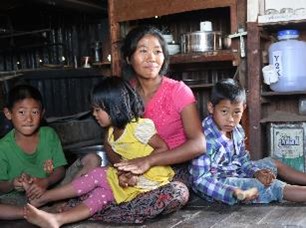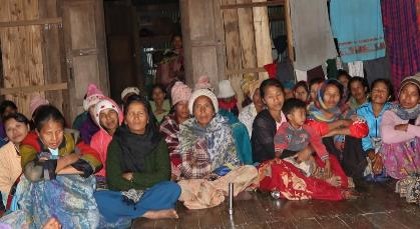Inclusion
Our goal
We aim to see communities where there is ‘a place for everyone at the table’ and ‘no one is left behind’. We envisage the following changes:
- Women feel they have equal value to men, and they have opportunities to speak up and participate in public processes
- Widows and single women are respected as courageous and committed individuals, able to both raise their children and contribute to the community
- Differently abled people have opportunities to participate in community life and they and their caregivers do not feel abandoned or lonely
- Women and differently abled people are aware of their rights and responsibilities in relation to land, forest, water and forest products
- Farmers are considered vital providers for the community and feel proud of their work
- Young people are respected – as future leaders growing into their roles
The challenges
Southern Chin State’s communities, are typically male-dominated, with able adult men holding most leadership roles in various community committees, the church and local government. As a result, the voices of young people, women, widows, and differently abled people often remain silent in community meetings or decision-making processes. Marginalized groups face many difficulties including social stigma, discrimination, and obstacles to full participate in community life.
In the home, men make most decisions, and many traditions result in women, and especially widows having little say or being treated unequally, especially as relates to inheritance or property. There are few women in leadership, and many women express that they lack confidence to speak up in public. Women’s unpaid work at home and for the family is often poorly recognized and wages are unequal for paid labour. Widows or otherwise single women express that they often suffer from isolation, experience rude or inconsiderate treatment, struggle to meet all their basic needs, and feel like a burden to their community.
Chin State is a particularly challenging place to be differently abled. The mountain terrain can make mobility very difficult for those with physical disabilities, and many suffer from isolation at home. Families with a differently abled member are sometimes regarded as pitiful or unblessed, may feel embarrassed to be out in public, and struggle to meet the demands of their own livelihoods combined with caregiving.
Children and youth are often dismissed as being too young for their opinions to be considered. Parents are often preoccupied with providing for daily needs and concerns on the farm, with little time to listen to their children and nourish their development.
“We widows really feel inferior. Speaking frankly, the community doesn’t treat us as they did when our husbands were alive. I work on the farm alone and come home alone. Sometimes I feel that if I express my worries people will think ‘this widow is useless’.”
~ Woman farmer
Another group at risk of being marginalised is uneducated farmers. Although farmers make up the majority of the population, as access to education and other opportunities grow, farming has become devalued. Young people today scoff at the idea of becoming farmers, and farmers often view themselves as inferior to their educated peers and leaders who are pastors, teachers or have other jobs.

“We used to think that we are low and unfortunate as farmers – we wished we could work as employees. But now we realize that our children’s education depends on healthy food and that comes from farmers. We don’t want another job now.”
~ Losi, a woman farmer and Family Farmer Group member
Our response
TSD believes in building communities into better places for everyone. Applying a rights-based approach, TSD works to empower and advocate together with Differently Able People (DAP) and widows or otherwise single women. Through our work with Self-Help Groups (SHGs), Family Farmer Groups, and schools, we also aim to empower and raise the profile of women, farmers and young people. TSD works to transform the situation for marginalised groups: improving their sense of value, dignity and belonging in the community. We advocate for conceptual and attitude changes among community members and leaders while also empowering marginalised groups through awareness of their rights and creating opportunities for greater participation in the community.
Main inclusion activities
• Researching, compiling and presenting materials on rights (based on national laws, international conventions, cultural traditions and religious teachings relevant to these communities)
• Advocacy towards duty bearers on inclusive decision-making, respecting perspectives and needs of all groups
• Supporting the formation of Village Development Committees and encouraging these leaders to advocate for the rights and entitlements of all
• Awareness raising actions to improve attitudes towards inclusion in the general community and promote the rights and entitlements of marginalised groups, such as celebrations of key international days, skits, songs and written materials
• Facilitating opportunities for public participation of marginalised groups during community meetings and special events
• Supporting SHGs that build confidence, skills and opportunities for women, including:
o encouraging groups savings and loans
o running community cooperatives for joint, inclusive buying and selling
o training on financial management skills and inclusive family development planning
o training on nutrition, food preparation, processing and preservation
o build confidence for public speaking and leadership
• Advocating for a youth and child-focused decade through school events
• Providing capacity building and encouragement for farmers through the Food Security Programme

Achievements in Inclusion
Current Programme:
- Signs of change in the attitudes of leaders and community members towards inclusion
- Reports of new confidence and sense of value among women, single women, DAP, young people and farmers
- 750 women are currently members of Self-Help Groups, benefiting from new opportunities and confidence
- International Women’s Day & Disability Day celebrations have become annual traditions
Past Achievements*:
- 67 Self Help Groups were formed (most in 2007) and have been running more than a decade
- Annual DAP Days were introduced as a celebration in churches throughout the Mara region with a collection taken for donations to DAP
- 25 DAP received skills training
*These achievements were reached before TSD was an independent NGO, but while TSD staff were working as a department of the Mara Evangelical Church.

“It’s very good to be an SHG member. We get informed about new things and increase our knowledge. We share skills with each other. We realize we’re not struggling with problems alone. In the group, our spirits are much higher than when we’re alone.”
~ SHG Member



TSD’s inclusion programme contributes to the following SDG targets for gender equality and reduced inequalities, as well as firmly committing to the cross cutting goal of the SDGs to ‘leave no one behind’.
• 10.2 – empower and promote the social, economic, and political inclusion of all, irrespective of age, sex, disability, race, ethnicity, origin, religion or economic or other status
• 10.3 – ensure equal opportunity and reduce inequalities of outcome, including by eliminating discriminatory policies and practices and promoting appropriate policies and action
• 10.4 – adopt policies to progressively achieve greater equality
• 5.1 – end all forms of discrimination against all women and girls everywhere
• 5.4 – Recognize and value unpaid care and domestic work through the promotion of shared responsibility within the family
• 5.5 – Ensure women’s full and effective participation and equal opportunities for leadership at all levels of decision making in political, economic, and public life
• 5.A – Undertake reforms to give women equal rights to economic resources, as well as access to ownership and control over land and other forms of property, financial services, inheritance, and natural resources, in accordance with national laws
• 5.C – Adopt and strengthen sound policies for the promotion of gender equality and the empowerment of all women and girls at all levels
